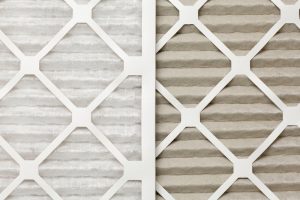 You may have heard about the problems of low indoor air quality in many homes. These aren’t alarmist warnings: the EPA has determined that poor IAQ in buildings is a significant health hazard across the country. In fact, the air inside a building—and this includes your cozy, happy home—can be as much as three to four times worse than the air outside.
You may have heard about the problems of low indoor air quality in many homes. These aren’t alarmist warnings: the EPA has determined that poor IAQ in buildings is a significant health hazard across the country. In fact, the air inside a building—and this includes your cozy, happy home—can be as much as three to four times worse than the air outside.
One of the basic solutions to poor IAQ for a home is to remove harmful particles moving through the ventilation system with a set of air filters. It takes special filters dedicated to air quality improvements for this job. But this raises a concern that the filters may end up making the air conditioner’s job harder (and eventually the heater’s job). Is there any truth to this?
Yes, a filter can lead to poor AC performance—even damage
Your instinct about a filter potentially blocking the airflow in your ventilation system is a correct one. This can easily happen unless you have professionals on the job of installing the filters. The standard air filter consists of media that traps unwanted particles in the air as it passes through the filter. The most familiar type of air filter uses a fiberglass mesh to do this job. If the filter weave is dense, it will stop smaller and smaller particles; but it will also slow down the flow of air from the air handler of the AC.
One of the immediate consequences of this is a drop in airflow from the vents around your house, which leads to a decline in comfort. The pressure on the blower motor will cause it to work harder, creating higher bills. There’s also a rise in pressure throughout the ventilation system that can create air leaks in the ducts and lead to issues with the AC such as frozen coils. An air filter that’s too strong is all-around bad news for an air conditioner.
How strong is “too strong” for an air filter?
This depends on the HVAC system. A filter’s effectiveness is measured as MERV, minimum efficiency reporting value. The higher the MERV, the smaller particles the filter stops—but also the more resistance to airflow it creates. Residential air filters should have a MERV rating between 4 and 12, but not higher. The well-known HEPA filter is usually too strong for home use; it is best suited for industrial and healthcare facilities.
Finding the right air filter
Don’t simply guess at the correct MERV for household filters. You don’t want to get this wrong and end up with a filter that either doesn’t stop the contaminants in your air or gives the AC grief. It’s the job of HVAC professionals familiar with filters, air purifiers, and other IAQ solutions to make the determination of the ideal set of filters.
No matter the reason you may need air conditioning repair in Eugene, OR or elsewhere in the state, you can depend on us to deliver. We have 24-hour emergency service available, and you can also rely on us to handle your indoor air quality services.
Comfort Flow Heating serves all of Oregon with residential and commercial HVAC.

